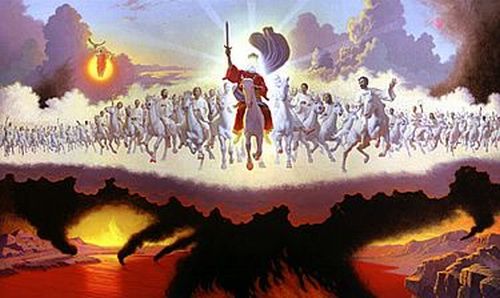
Dec 6, 2012, by Rev Dr Steven Kau-
Over the years pastors have often wrestle with this issue when an infant dies and they have to comfort the parents. Besides assuring them that they believe the infant is with the Lord, they rather not dwell too deeply into this issue.
There is a tendency to think that the Bible is silent about the issue of what happens to infants who die. However, there are at least 26 different passages that addresses this issue. In all of them, the implication is that infants who die are returned to the Lord.
So as you go through this list, don’t get caught up on one or two particular ones if you have a different point of view. Simply skip those and let the weight of the others give you confidence. Right now, we will look at what the Old Testament had to say on this issue. This will be followed later with what the New Testament had to say.
1. Infants belong to God in a special and particular way. In Ezekiel, God describes the slaughter of children born into pagan families as a slaughter of “my children.” (Ezekiel 16:21) This expression of ownership by God over children born into idol worshipping families is stark and implies God’s care for those children in a personal way.
2. God describes children as “having no knowledge of good and evil.” (Deut. 1:39) They have a sin nature but they sin in the way that gravity works: they are pulled down. They do not sin in the way that adults do; adults love sin. Children default to sin, while adults run there.
3. God refers to Gentile children as unable to discern the difference between right and wrong. (Jonah 4:11) Children are born with a sin nature and even babies love to sin. But they do so without appreciating why they are doing it. Adults sin because they discern what truth is and have a disdain for it. Infants sin because they are unable to discern. There is a difference.
4. God refers to children in pagan families who are murdered as “innocents.” (Jeremiah 19:4) Obviously this does not mean that they were born without a sin nature but simply that they had a certain degree of moral innocence. God does not throw around the term “innocent” loosely (nor does He send “innocent” people to hell.)
5. God regards children as victims of the fallen world. This is the example in Ezekiel 16:4 which is clearly an allegory but an allegory that only makes sense if children are innocent victims.
6. When God punished the entire nation of Israel for their disobedience in the wilderness, He took the lives of those who were of fighting age or older. (Deut. 1:39) This shows that the culpability of those under fighting age is different than the adults and that accordingly they should not be punished as adults are. If they didn’t deserve to die in the wilderness, they certainly didn’t deserve to go to hell.
7. Babies will not be punished in hell for the sins of their parents, even of Adam. Deuteronomy 24:16 explains that God will not punish children for what their parents did. This does not mean that there are no consequences for sin; a parent who lives a sin filled life will reap the consequences of that life and one of those consequences is that the children will be raised apart from the knowledge of God. But that is the consequence of sin and is manifestly different than God judicially punishing someone for sins they did not commit. The consequences of Adam’s sin is that we all are all born with a sin nature but not that God will send us all to hell irrespective of our own actions. (More on this when we look at the New Testament passages)
8. This same truth is repeated in Ezekiel 18:20. There, God expressly says that while death is the consequence of a sin nature, God does not execute a second death on a person because of his parent’s sin.
9. When God’s prophet told King Jeroboam that his entire family line would be killed, He expanded on this category distinction. He said that all of Jeroboam’s relatives would be punished by a humiliating burial (or lack thereof) but that there was an exception for Jeroboam’s infant son. He would be buried and people would mourn, “because in him there is found something good toward Yahweh, God of Israel.” (1 Kings 14:13) It is not that the infant was crawling around chewing down the high places but rather that his sin was by his nature not by his willful rebellion. He was an “innocent” infant, to borrow Jeremiah’s language and so he will still die but will be spared the judicial punishment reserved for those who willingly revolted against God. Again, notice that in both this passage and in Jeremiah 19, God uses positive moral terms to apply to infants who die “innocent’ and “good.” Those are moral terms that God does not use willy-nilly.
10. God created all people personally and designed them to glorify Him forever, either by justly suffering in hell or by giving glory to them in heaven. (Ps 139:13-15; Romans 9:24) If infants who died were sent to hell, they would not be suffering justly, as they did not sin in a willful way. In other words, the very justification for hell (namely, an expression of God’s justice) is thwarted if infants go there.
11. Job 3:16-19 is the most explicit passage in the Bible concerning the fate of infants who die. Job declares that dead infants go to a place where “There the wicked cease to make trouble and there the weary find rest. The captives are completely at ease; they do not hear the voice of their oppressor. Both the small and the great are there and the slave is set free from his master.”
Obviously, Job is not describing hell and his generic use of “infants” as well as “a stillborn child” implies that this is a statement with universal application. All infants who die or who are stillborn go to a place of rest, where there are kings, rich, poor and the afflicted and they are all free from torment. This is obviously not the description of hell.
12. Solomon makes a similar and explicit proclamation about the fate of dead infants. He expressly contrasts the fate of the wicked who labor in vain with a dead infant fathered by that wicked person. He concludes that it would be better to be the dead child, because he at least will go to a place of “rest.” (Eccl. 6:5) Solomon goes on to say that both the child and father will die but only the dead child will experience rest.
13. Isaiah refers to an age where children learn “the difference between good and evil.” (Isaiah 7:16) In other words, there is an age where children still sin, but not because of their knowledge of sin. At the very least, this lets us know that God view the sins of infants as coming from a form of innocence, rather than from a discernment of good and evil.
In our next study we will continue this list with a look at what the New Testament teaches about those who die in infancy.
Rev. Dr. Steven Kau is the pastor of Faith Covenant Church. The church address is at 1-1 Jalan Putra Mahkota 7/5B, 47650 Putra Heights, Subang Jaya, Selangor. Sunday service in English starts at 10 am. His email contact – kausteven@gmail.com
Disclaimer: The views or opinions expressed by the columnists are solely their own and do not necessarily represent the views or opinions of Christianity Malaysia.com
Dear Viewers in Christ, if you do find this article edifying to you, please do not hesitate to use the social media plugs (Share, Email to this article) to bless your friends. The Lord will surely bless you even as you bless others. May the Lord’s peace and love be with you. Amen.
References:
http://www.tuvy.com/blog/wp-content/uploads/2011/01/asian-baby-laughing.jpg
http://www.wholemagazine.org/uploads/1/3/7/7/13775371/610876715.jpg?373
http://www.kveller.com/blog/wp-content/uploads/2011/11/baby-sleeping.jpg









Leave a Reply